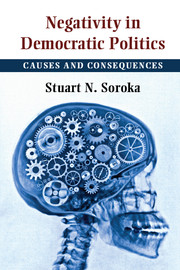Book contents
4 - Economic Sentiment and Government Approval
Published online by Cambridge University Press: 05 June 2014
Summary
Bad news goes about in clogs, good news in stockinged feet.
– Welsh proverbThe preceding chapter focused on negativity biases in individual-level political behavior. Here I turn to aggregate-level data. Results are driven by the same underlying, individual-level tendencies, but a major advantage of aggregate-level survey data is that they are more readily available over extended periods of time and across many countries. Aggregate-level data also provide an opportunity to consider not just the immediate, asymmetric impact of negative versus positive information, but also the possibility that the impact of negative (or positive) information varies over time.
The chapter begins with time-series models of economic expectations using a combination of data from the Michigan Consumer Surveys and the European Economic Sentiment Index. Results suggest that economic expectations react asymmetrically to macroeconomic trends, not just in the United States but across the developed world. Then, the chapter connects both U.S. presidential evaluations and UK government approval with economic expectations – it examines asymmetries in the link between how voters feel about the economy and how they feel about their leaders/governments. These analyses are important in that they provide additional evidence of negativity biases in political behavior. But they are also partly just a precursor to the penultimate section, which explores the possibility that the negativity bias shifts in periods of predominantly positive or negative information. Overall, negative changes in the economy matter more to public preferences than do positive changes. But do negative changes in the economy matter as much when the economy is already rather bad? The answer to this question appears to be no, and that answer forms a critical part of my view of negativity in politics. The negativity bias is reduced when the information environment becomes predominantly negative. This helps explain why we are not endlessly negative – at some point, when things are particularly bad, we start focusing on the positive. This finding opens up the possibility that negativity in politics is self-correcting.
- Type
- Chapter
- Information
- Negativity in Democratic PoliticsCauses and Consequences, pp. 51 - 71Publisher: Cambridge University PressPrint publication year: 2014

